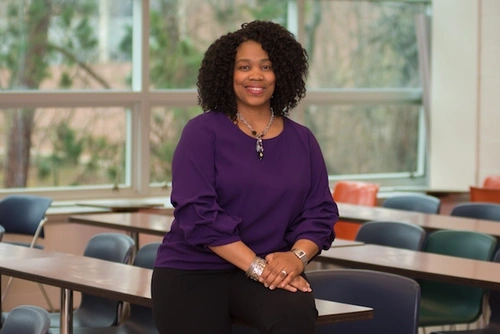Dorinda Carter Andrews, Professor and Chairperson of the Department of Teacher Education at Michigan State University, spoke at Penn GSE March 24 as part of the Visiting Faculty Scholars of Color lecture series. | Photo courtsey of Michigan State University College of Education

Race, culture, and power all intersect with teaching and identity. The pandemic has served to magnify the reckoning that was already headed towards teacher education. We are no longer able to operate in the same ways, and the modalities of teaching and learning have expanded. As teacher education adapts, it’s time to plan out its justice path forward.
In reforming teacher education, “it’s not a tweaking, it’s a reimagining, because the initial structure was rooted in whiteness as a cultural norm,” said Dorinda Carter Andrews, Professor and Chairperson of the Department of Teacher Education at Michigan State University. Carter Andrews’ March 24 discussion on Decentering Whiteness in Teacher Education was part of Penn GSE’s annual Visiting Faculty Scholars of Color lecture series.
Future teachers of color often encounter a “doubly toxic” experience of racism in both teacher education program and schools. “If you don’t design a program that decenters whiteness, you can’t implement one, and you can’t serve those students well,” Carter Andrews asserted, pointing to the responsibility of higher education institutions to decenter whiteness in their programs. “And you can’t decenter whiteness and turn to something you know little about alone,” she continued, explaining that school and community involvement is essential. Amongst the barriers to increasing teacher diversity is the gatekeeping mechanisms at higher education institutions and how future teacher educators are deemed to be “skilled” or “qualified” enough to be admitted. This goes beyond teacher educator programs too; Carter Andrews says we should also be thinking about related programs, such as school counseling.
Higher education institutions also have a responsibility to support students once they’re enrolled. “A diversity course is not decentering whiteness,” Carter Andrews said. “It has to be a through line,” from incorporating antiracist pedagogy to hiring and supporting more faculty of color and ensuring other people involved in training teachers, like mentor teachers, are also racially diverse.
These are tough conversations and questions, Carter Andrews acknowledges. “I have hope that teacher education can be authentically justice oriented as we move through and beyond Covid, but it is going to take intentionality around decenterizing whiteness that addresses the who, with whom, and how,” she closed.
Carter Andrews’ research is broadly focused on racial justice and educational equity. She examines issues of racial justice in pre-K–12 learning contexts and on college campuses, urban teacher preparation and identity development, and critical race praxis with K–12 educators. Her scholarship illuminates voices of youth and adults who have been historically and traditionally marginalized in schools and society.
Media Inquiries
Penn GSE Communications is here to help reporters connect with the education experts they need.